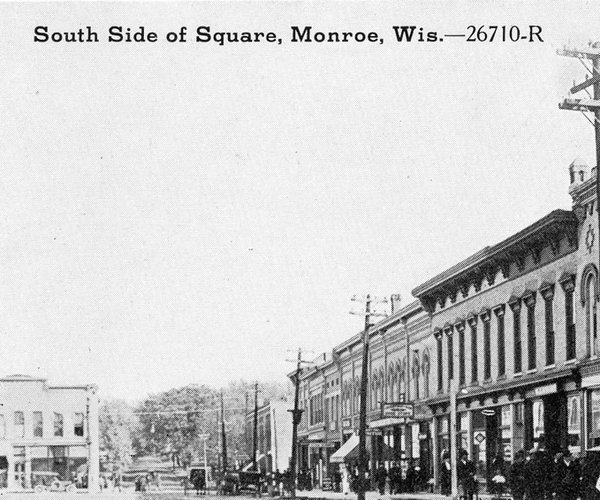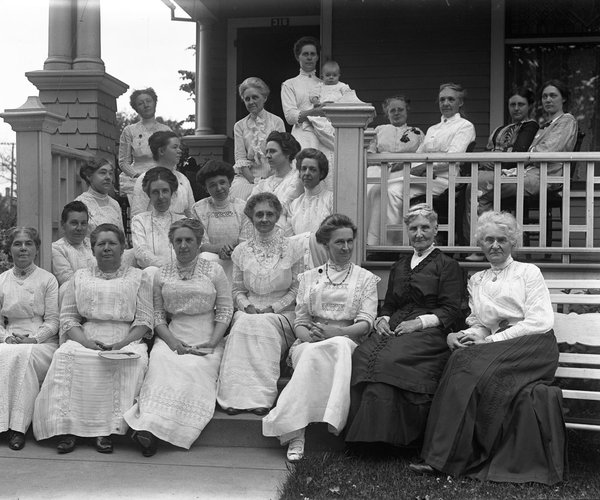You may recall a previous column about farmhand Burkhard Brahm who, with his employer’s wife, plotted and succeeded in killing his employer, Henry Stuessy, in 1882. This was an extreme case of farmhand/farmer conflict that went too far. But there were more cases of conflicts between farmers and their employees, as will be shown today.
In 1917 Henry Eldridge, who resided eight miles north of Brodhead, had an altercation with his “farmhouse employee,” Louis Von Larr. According to the June 9 issue of the Monroe Evening Times, the men had a quarrel and Von Larr attacked Eldridge with a pitchfork. In self defense, Eldridge secured a shotgun and opened fire. After he had “exhausted his stock of ammunition,” he beat Von Larr into submission with the shotgun. Tom Cavanaugh, deputy sheriff from Brodhead, was notified and took Von Larr into custody, bringing him to Monroe on the noon passenger train for medical attention. He was taken at once to the county farm where 24 shots were removed from him, most of them from the legs.
The name seems to have been spelled incorrectly in the June 9 issue, but was corrected in the June 9 edition. According to the 1919 Prairie Farmer’s Reliable Directory, Henry E. Eldred owned 200 acres in Section 35 of Albany Township.
As Sheriff C. F. Englehardt was preparing to leave for Brodhead on June 11 to serve a warrant on Henry Eldred on a charge of assault with attempt to commit murder, Eldred walked into the courthouse and surrendered himself. According to the neighbors, Eldred had a quarrelsome nature, and was constantly having trouble with those with whom he comes in contact. According to one story, the hired man, who is much smaller than Eldred, was knocked down by his employer and shot as he lay on the ground. Eldred furnished bonds of $1,000 and was released until his preliminary hearing on June 25.
Eldred appeared before Justice W. T. Saucerman on June 25 and was bound over to the circuit court. The only witness to the incident was William Gibson, a near neighbor. The testimony showed that Von Larr was shot in the feet, which is not considered sufficient to support the murder charge; it was expected the charge would later be modified.
An article in the Monroe Evening Times in 1920 stated that John McDermott “was considerably battered and bruised in a fistic encounter with the farm hand, William Abbe, following a quarrel over wages on April 14.” McDermott, 65, declared that “Abbe, who is a young man, beat him up and left him lying in a field in a helpless condition. Abbe was arrested and released on bail, his hearing on a charge of assault and battery” was to be held at Albany on April 23 before Justice S. L. Gothompson. There was less printed in the Albany Vindicator about this incident than there was in the Monroe paper. The 1919 directory showed that John McDermott lived in Section 1 of Albany Township and owned 570 acres as well as rented another 80 acres.


Also in 1920 John Bauer was a farm hand employed by Joe Becker, 2 miles north of New Glarus. Bauer was arrested on June 18 by Sheriff A. E. Mitchell on a complaint made by Becker that Bauer had created a disturbance with a gun. It was said that Bauer had fired a pistol at the floor in a New Glarus Hotel the evening before while under the influence of “sweet cider.” Fortunately, nobody was injured. According to Becker, Bauer returned to the Becker farm and the Becker family became alarmed when they learned that Bauer carried a pistol. Mr. Becker refused to press charges, so Bauer was released. Becker owned 171.5 acres in Section 10 of New Glarus Township.
Ernest Steuri, a 20-year-old farmhand, was arraigned before Justice W. T. Saucerman in Monroe on February 28, 1921 on a charge of assault and battery made by his employer, Sam Ubert, Jr. Steuri entered a plea of not guilty; the hearing was set for Friday, March 11. The altercation occurred at the Ubert farm in Jefferson Township over a dispute about wages that were due to Steuri. Ubert received injuries about the head with his right cheek bone “having been smashed in.” Steuri stated that he was struck first and thought he was justified in striking back. Nothing was found in the newspaper about the results of the hearing.
Being a farm hand had to be an interesting situation when many of these young men would live in the home with their employer. They would eat their meals with the family and, probably, had their laundry done by the woman of the house. If the farmhand was raised in the same way that the employers raised their children, there was probably less conflict. There were probably no written contracts, so wage disputes might have been more common.
It was reported on August 13, 1920 that Andrew Patern, 45, an unmarried farmhand on the John Voegeli farm near Verona, died suddenly from heart failure while working on a straw stack the day before. He had only been on the stack about 10 minutes when he suffered a heart attack. He was breathing his last breath when Mr. Voegeli and son reached the scene.
Tony Ziger, farmhand on the Ernest Loberger farm about 5 miles east of Monroe, was severely hurt on January 29, 1921 when he fell from a wagon that had been hit by an automobile “on the south Juda Road.” Ziger was returning to the Loberger farm with a wagon of milk cans. The auto came up from behind, hit the wagon, and was able to speed away because it did no damage to the car. However, the horses were frightened and ran, which threw Ziger from the seat to the ground. He landed on his back and was knocked unconscious. It was feared that his back was broken, but the injury was not so serious.
— Matt Figi is a Monroe resident and a local historian. His column will appear periodically on Saturdays in the Times. He can be reached at mfigi48@tds.net or at 608-325-6503.




